
MENUMENU
TALK TO AN EXPERT
Special Hours: 7AM – 6PM PST
TALK TO AN EXPERT
Special Hours: 7AM – 6PM PST
Advancements in solar power have made it easier and more affordable than ever to set your rig up to be powered by the sun. But, you may find yourself asking, how much solar do I need, anyway? If you under-size your system, you may not have enough power to live as you want. If you over-size it, you run the risk of wasting a ton of money.
Let’s take a closer look at how these systems work and how to find the right size for you.
RV solar systems work the same way as traditional solar panels for a home. The main difference is size and portability. Most systems have an array of solar panels, either mounted directly on your rig or on a portable module set up on the ground at your site.
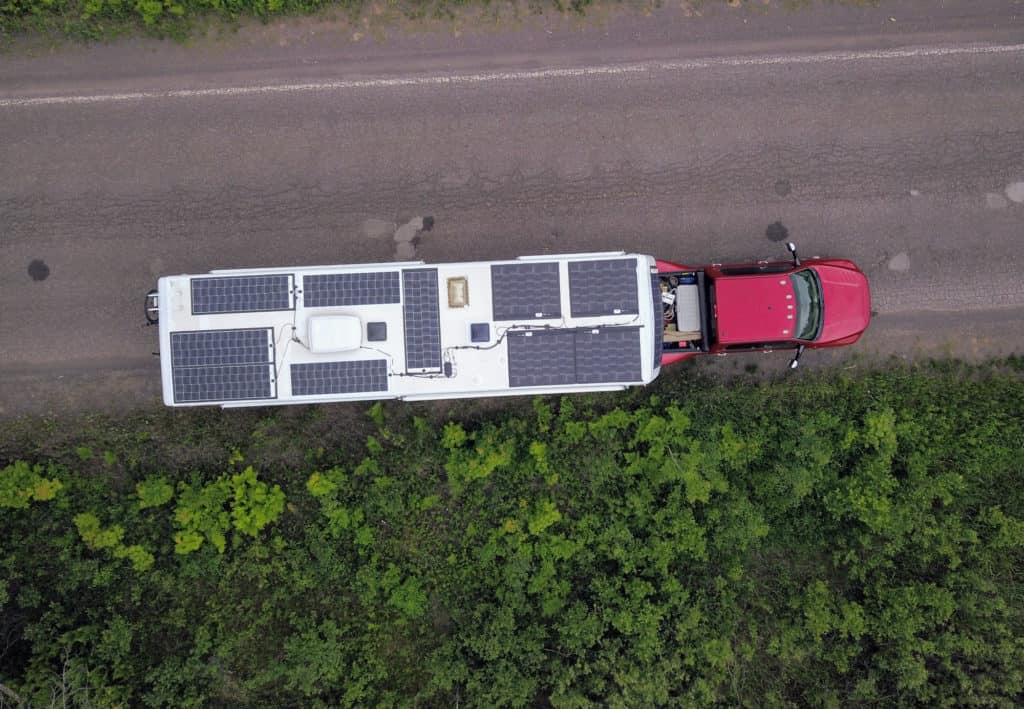
The solar panels capture energy from the sun and convert it into electricity—specifically, DC power. The electricity from the solar panels passes through a charge controller, which conditions the power for safe and efficient storage in your batteries.
Remember that without an RV battery inverter installed in your RV, you’ll only be able to use DC systems while boondocking. Inverters take the DC power from your batteries and change it to AC, which runs your microwave, air conditioner, and traditional outlets.
Solar power systems come in all sizes and can be scaled up or down based on your needs and budget. Now, you may be wondering, how much solar do I need? Here are the best ways to figure it out.
One option for determining how much power you consume is to estimate based on the appliances and devices you use and how long you use them each day. Your goal is to arrive at an estimate of the total watt-hours consumed each day. Let’s see how we get there.
All of your devices and appliances should have a label that tells you their power consumption in either watts or amps. If the device only lists amps, multiply by the voltage to get watts. For example, a 120-volt hair dryer may have a label that says it draws 13 amps. The power consumed by the hairdryer would be about 1,600 watts (120 x 13 = 1,560).

Once you have the power consumption of all of your devices (in watts), you need to determine how long (in hours) you typically use each device per day. Once you know the appliance’s usage time and power draw, you multiply them to get watt-hours.
For example, back to our hairdryer, if you dry your hair every morning for 5 minutes (5 minutes is about .1 hours), you would use about 160 watt-hours each day (1,600 watts X .1 hours = 160 watt-hours).
Now, repeat this process for all of your devices and appliances. Once you have the daily watt-hour consumption for each device, add them together to get the total. You’ll use this total number of watt-hours in a moment to determine how many solar panels you need.
Many of our customers ask, “Can I Run My RV AC Unit on Lithium Batteries?” The answer is yes if you size your system correctly.
You can make tedious assumptions and estimates about your power usage, or you can get out there and do some camping tests. This is one of the best ways to determine how much power you actually use. This method takes a little bit of time but will keep you from over-estimating and spending way too much on your solar system or under-estimating and not having enough solar. Plus, it’s a lot more fun than trying to add up all your devices and doing math.
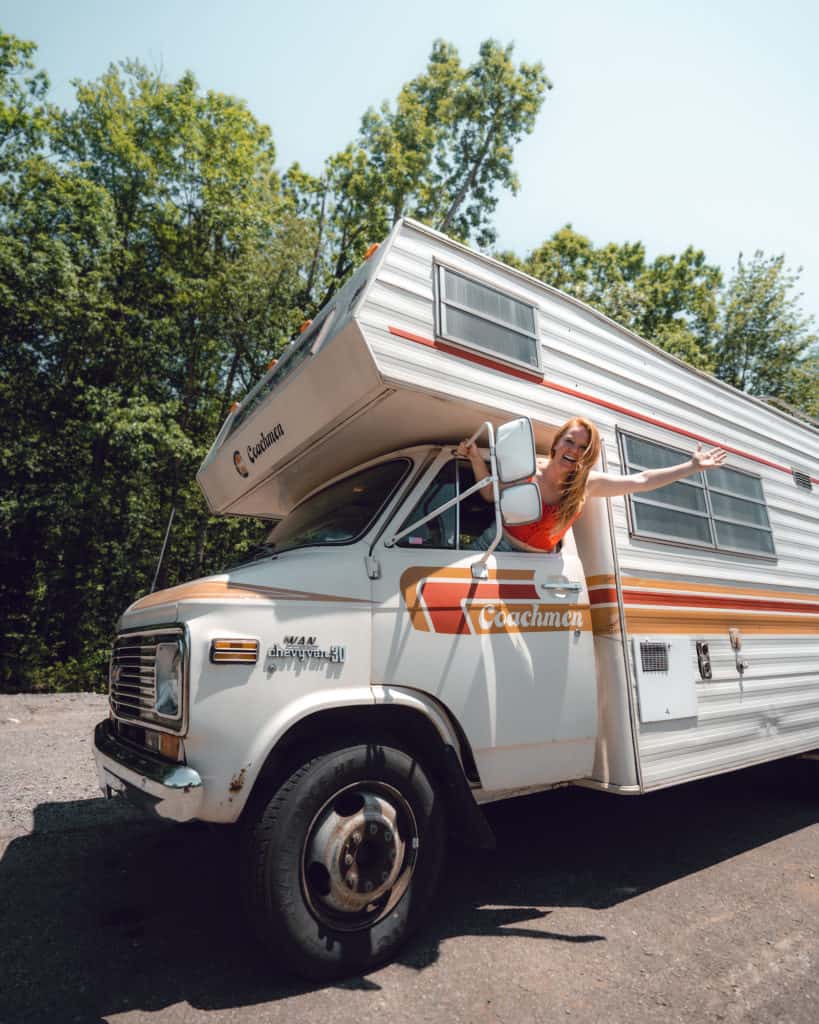
If you already have batteries, fully charge them and then head off the grid for a weekend of camping. Use your RV as you normally would. Try not to use more or less power than you typically do. You’re doing a power audit, so you want the results to be accurate.
Use a battery monitor, like the Victron BMV-712, to keep track of your battery bank charge status and your amp-hour consumption over 24 hours. When your 24-hour test period is complete, note how many amp-hours you have consumed. Multiply your amp-hour consumption by your battery voltage (usually 12.6V for lead-acid or 13V for lithium) to get your watt-hour power consumption.
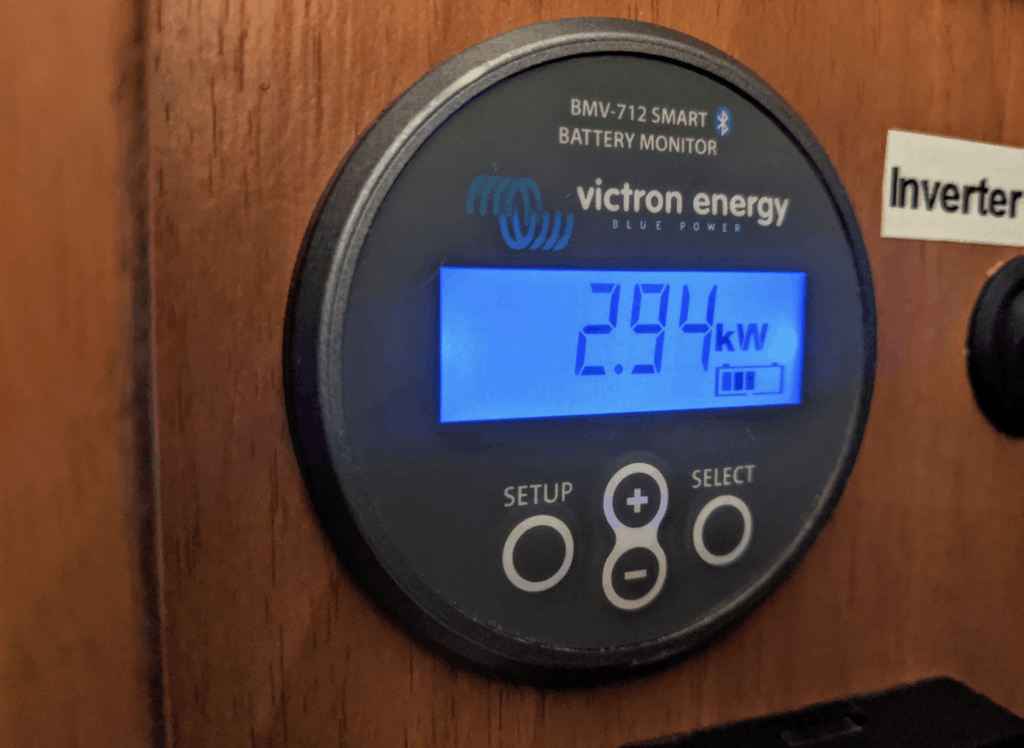
For example, your battery monitor tells you that over 24 hours, you used 135 amp-hours from your lithium battery bank. This works out to be about 1,755 watt-hours (135 amp-hours X 13 volts = 1,755 watt-hours).
Alternatively, you could do the same test while connected to shore power. Use a power monitor like the Watchdog surge protector and power monitor to tell you your watt-hour consumption over a 24 hour (or longer) period. Since the shore power charges batteries, you will get a reading on your RV’s AC and DC power needs.
Now that you know your average daily power consumption, you can answer your original question of “How much solar do I need?” reasonably quickly. More specifically, a better question may be, “How many solar panels do you need?”
To answer this question, we need to understand how much energy a solar panel truly generates. Most people assume that if they have a 100-watt solar panel in the sun for an average of eight hours during the day, it will produce 800 watt-hours of energy (100 watts X 8 hours = 800 watt-hours).
In reality, weather, time of year, and location all impact the efficiency of solar panels. A good rule-of-thumb is that a 100-watt solar panel will generate about 30 amp-hours (approximately 350 watt-hours) per day.
With this in mind, you can take your total daily energy consumption and divide it by 350 to get an estimate of how many 100-watt solar panels you need. Let’s look at our previous example.
If you’ve determined you use about 1,755 watt-hours per day, you will need at least five 100-watt solar panels (1,755 / 350 = 5).
Before you start soaking in those rays, some additional considerations could affect your solar system or even prevent you from getting one altogether.
Many people feel that the battery bank is the most critical component in any solar system. It doesn’t matter how much power your solar panels generate if you have nowhere to store it for when the sun stops shining.
Lead-acid batteries have been the standard in RV electrical systems for years, thanks to their easy availability and low cost. However, they have many disadvantages like requiring frequent maintenance, being damaged if you drain them below 50% of their capacity, and they have a short lifespan, to name a few.
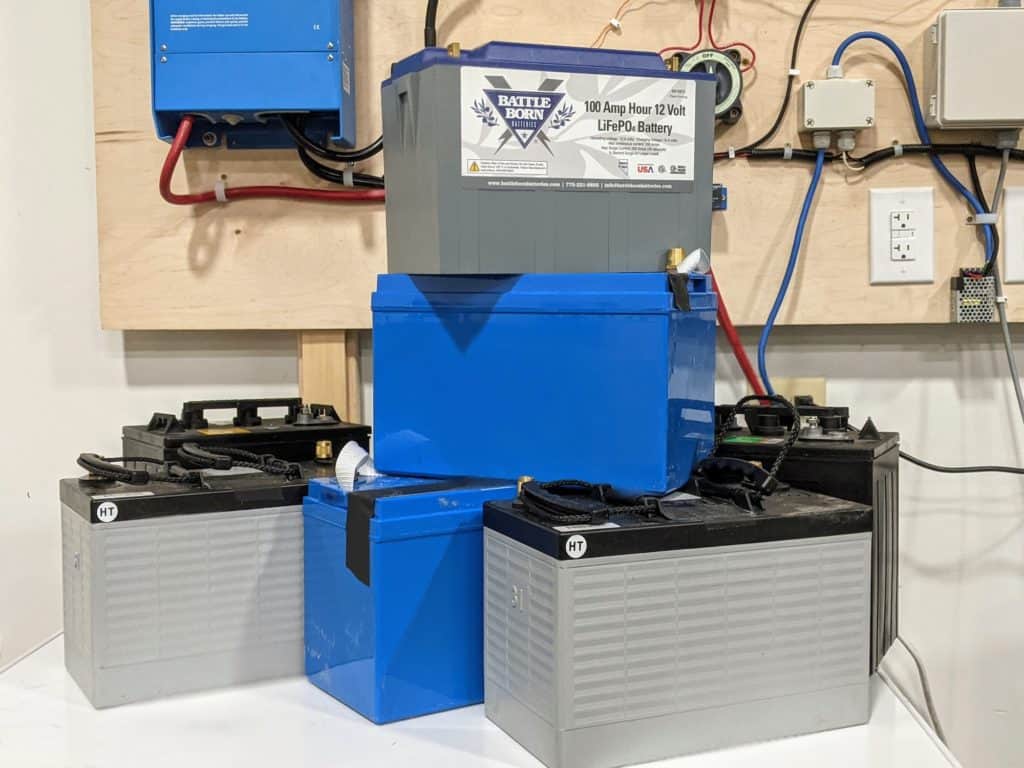
Lithium-ion batteries are a newer technology that offers many advantages over their lead-acid counterparts. They provide greater capacity, efficiency, and depth of discharge, both of which are critical if you’re relying on your batteries and solar system as the primary source of your electrical power. Additionally, lithium batteries weigh about half of what lead-acid batteries do, require no maintenance, and usually last more than ten years.
➡ Read more about why lithium is the best choice for solar power systems
All of these benefits come at a price. Lithium-ion batteries have a higher upfront cost, but over the battery life, they end up costing less and saving you money.
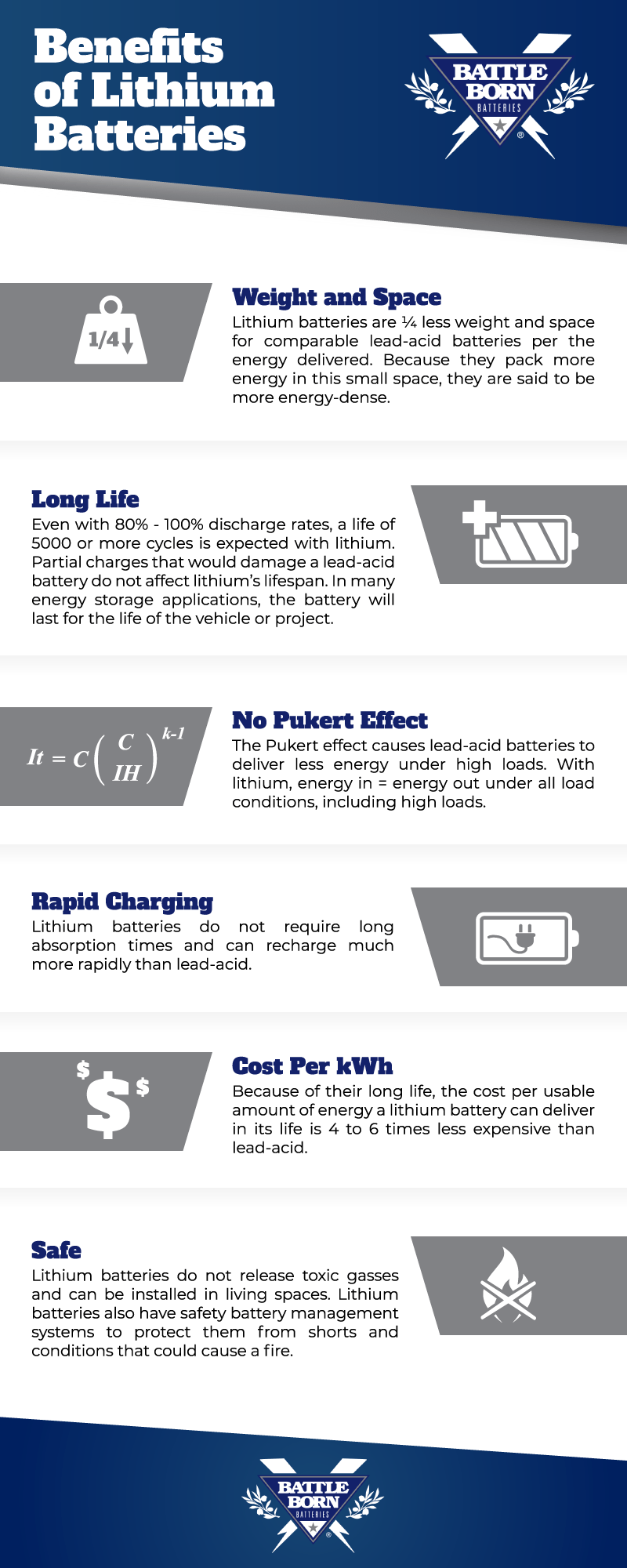
There may be expenses you’re not expecting when you start to consider adding a solar power system to your rig, like with any complex system. You’ll need more than just solar panels to complete your setup.
The cost of charge controllers, potential battery upgrades, mounting hardware, and more can eat up your budget quickly if you’re not careful. Additionally, if you’re not comfortable doing the work yourself, you will need to factor in the cost of paying someone to install your new system.
Solar panels aren’t small, and RV roofs aren’t very big. If you are roof-mounting your panels, take careful measurements and cross-reference with the dimensions of any potential panels. Measure twice just in case.
For some heavy electricity users, it’s possible you may not have enough space on your RV’s roof to generate the power you need. In this case, you will need to look into supplementing your roof-mounted panels with other power sources or growing your battery bank to store more energy.
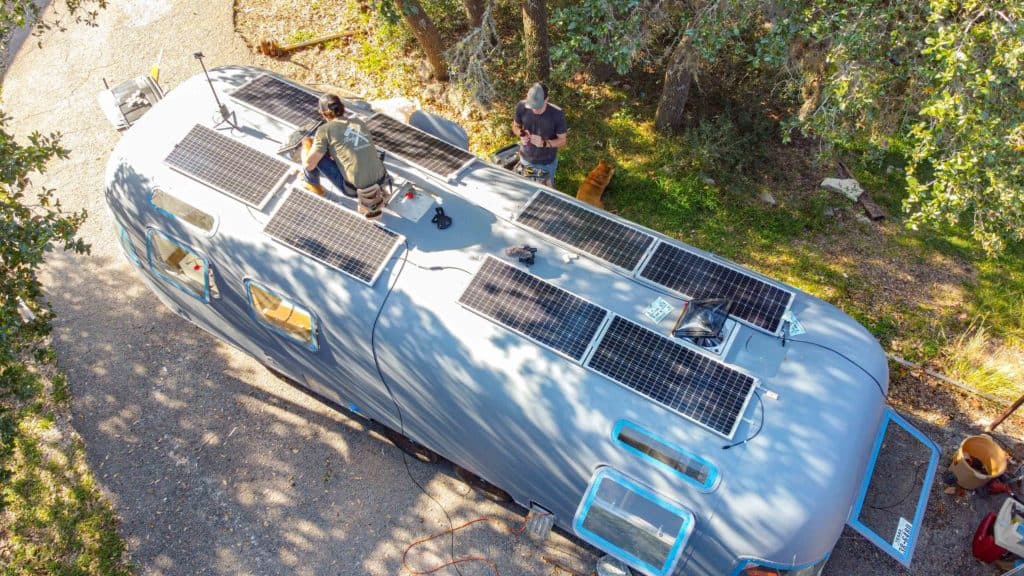
Depending on your needs and travel style, you may want to opt for a permanently mounted system on your roof or a more portable array that you place on the ground at your campsite. Portable systems offer more flexibility, allowing you to maximize your sun exposure, even if you park your RV in the shade. However, you’ll need to assemble and disassemble it every time you change campsites. This is a lot of work for those who travel frequently.
On the other hand, a permanently mounted panel system doesn’t require much additional setup at a given site, but it requires you to park your rig in a way that maximizes sun exposure. Unfortunately, this can also increase the heat in your RV, potentially increasing your overall power usage.
“Solar Ready” is a bit of a nebulous term that varies in meaning from one manufacturer to another. Generally speaking, it means the maker of your RV has added some features to allow the addition of solar panels more easily. In many cases, this may be as simple as a special plug or outlet that can allow you to plug a solar panel into your electrical system quickly.
However, there are some potential drawbacks as well. You may only be able to use a specific brand or style of panels with the connection. Companies do this to encourage you to purchase solar equipment directly from them or their partners. Luckily, modifying this setup or simply installing your own isn’t usually difficult, so don’t feel trapped by this!
How much solar do I need? It can feel like a complicated question. With the simple principles and formulas above, you should be able to perform a power audit on your RV and size your solar system with ease. Before you know it, you’ll have a self-sufficient, off-grid power system that will allow you to go anywhere the sun’s rays can find you.
If you need help getting started, check out our Battle Born Solar bundles for some quick-start setups with solar power. You can also call our technical support team in Nevada at (855) 292-2831 with any questions!
We know that building or upgrading an electrical system can be overwhelming, so we’re here to help. Our Reno, Nevada-based sales and customer service team is standing by at (855) 292-2831 to take your questions!
Also, join us on Facebook, Instagram, and YouTube to learn more about how lithium battery systems can power your lifestyle, see how others have built their systems, and gain the confidence to get out there and stay out there.
Shop Best Sellers








Ask a technical specialist now at 855.292.2831
Stay in the Know
9 thoughts on “How Much Solar Do I Need? How To Size Your RV System”
Thank you for writing this it is really useful for me. This is my first time using Solar power so I want to learn more about them
This is my first time using it, thanks to the information in your post I was able to know how much solar I need to fit my RV, thank you for writing this!
To operate its appliances and provide us with comfort, safety, and convenience while on the road, an average RV requires 120 Amp-hours of solar energy. A RV can use as much as 240 – 360 Amp-hours of solar energy to run smoothly
I’ve decided to upgrade my RV with solar power, and I don’t know how many solar panels are needed. How Do You Determine Your RV’s Solar Power Requirements?
The basic idea is to figure out how much energy your RV actually uses. The battery banks, solar panel number, and solar charge controller are all calculated using this value in an RV solar panel size calculator.
I am still very confused how to figure this out. I’m getting a 31′ RV from my nephew. It has a mini split, fridge, hot water tank, and various appliances, including TV and cell phones the kids will use. We will be in at most of the summer but a lot of the weekends. It seems very complicated to try to use your formula I don’t know how to figure out how much we would use?
Hi Barb! Our technical sales team would be happy to assist you with configuring your system and determining how much solar you need. You can reach them at (855) 292-2831 M-F 8:00am-4:30pm (PST) or by emailing [email protected]
We have a 2021 29 ft. travel trailer it is set up for a solar power. We have a refrigerator and AC how much amps do we need.
Hi Connie! Our technical sales team would be happy to assist you with configuring your system. You can reach them at (855) 292-2831 M-F 8:00 am-4:30 pm (PST) or by emailing [email protected]